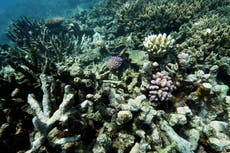Don’t back down, Rishi, on green ideals – it will allow devastating deep-sea mining
Former environment minister Zac Goldsmith explains why the UK cannot afford to lose its nerve in the face of increasing pressure to abandon its commitment to the environment, not least because of the urgent threat to our precious ocean ecosystem


The UK has worked hard to put protection of the natural world and restoring biodiversity at the forefront of international negotiations. We have brought together and led international coalitions that have the capacity to deliver genuine change.
Alongside hosting Cop26, where we successfully brought nature from the margin of the margins of climate politics, we galvanised international agreement at the UN Plastics Pollution Treaty, led calls to protect 30 per cent of the world’s land and ocean at the biodiversity Cop15, and spent 10 years at negotiations for the Marine Biodiversity of Areas Beyond National Jurisdiction (BBNJ) Agreement. Our negotiating teams are respected worldwide – and rightly so.
But like most agreements, the real victory will be in the implementation of these treaties – and that is where some of my concerns lie. And recent events, and lack of action, have raised questions about whether we remain worthy of this hard-won respect. We have rowed back at home and abroad, shied away from international conferences, failed to tackle overfishing in our own waters and failed to take positions on some of the most important environmental issues of our time.
As the UK government adopts a more passive approach, we know that certain commercial entities will capitalise on our apathy to wreak havoc on our environment. As I write, there is a little-known body called the International Seabed Authority (ISA) convening its 167 member states to discuss carving up and mining the world’s largest ecosystem – the deep sea.
Deep-sea mining is the proposed extraction of critical minerals from the seabed many thousands of feet down. Proponents argue that we need cobalt, manganese and nickel found in the deep seabed to power green technology used in the transition towards a low-carbon economy, such as wind turbines, solar panels and electric vehicles (EV) batteries.
However, it is simply not true that we need to source these minerals from the deep sea. The claim has been comprehensively debunked by 756 scientists from 44 countries. Indeed, businesses directly involved in the energy transition like Google, Samsung and major electronic vehicle (EV) companies such as Renault, BMW Group, Volvo, and Volkswagen have gone so far as to say they will not use minerals from the deep sea in their supply chains. Huge international investment institutions have announced they will not fund deep-sea mining, and the economic case is falling apart extremely quickly – to the extent there have even been discussions at the ISA about how deep-sea mining could be subsidised with taxpayer funding.
Perhaps as important is the fact that despite its proponents arguing that we need deep-sea mining to tackle climate change, it would in fact make climate change worse. The deep sea is one of, if not the, biggest carbon sink in the world – and ploughing it up will release vast quantities of carbon.
Deep-sea mining is the equivalent of clear logging the Amazon rainforest to get wood. It will cause vast damage to complex and critically important ecosystems, and would also delay necessary moves towards more sustainable use of existing resources. And the scientific and business community consensus is that the energy transition is fully achievable without extracting minerals from the deep sea.
The problem is that despite this, a small number of businesses that would profit from deep-sea exploitation have strong-armed and panicked the international community to find ways to regulate a practice that is fundamentally irreconcilable with a healthy and sustainable planet.
And so today we are seeing a scramble from governments, desperately trying to find a way to make safe a practice we all know cannot be. Deep-sea mining will devastate the largest ecosystem on the planet. The deep sea provides 95 per cent of all habitable space on Earth. In just one proposed site for deep-sea mining – incidentally, the first place that mining would happen – more than 5,000 new species have been discovered. The current scientific estimate is that there are half a million species yet to be discovered.
The deep-sea mining process unavoidably obliterates critically important features of the marine world, like deep-sea corals and sponges. It creates huge sediment plumes that disrupt nutrient cycles; it causes huge amounts of noise that will impact heavily on sensitive whales and dolphins; and it reduces the light and oxygen that marine organisms need simply to survive.
Common sense tells us these are some of the consequences, but we also know this because exploratory deep-sea mining tests conducted by Japan resulted in a 50 per cent decrease in marine wildlife in both the mining region and surrounding areas.
Despite irreversible damage to the environment and no discernible benefit to the UK, the UK government is yet to take a clear stand against deep-sea mining. For a while, the government worried about being an outlier, but today some 22 ISA member states, including France, Germany and Canada have called for a ban or moratorium on deep-sea mining. They join financial institutions such as Credit Suisse, Lloyds and NatWest, and big businesses such as Google, Samsung, BMW Group, Renault and Volvo in calling for the same.
The UK position is a cautious one. We are not pressing for deep-sea mining, and we have said we will not support exploitation licences until regulations and guidelines are in place. And that of course is welcome. But our position falls far short of saying we will support efforts to prevent it, and the simple truth is that unless we support our friends and allies in explicitly opposing the opening of this terrifying new frontier, at least until the science can justify it, then deep-sea mining will likely begin.
Given the scale of the environmental crisis we face today, there are of course so many causes that need UK leadership and action. We delivered big and meaningful commitments for the natural world as COP26 presidents, and again at the Biodiversity COP in Montreal. If all the agreements reached in the past three or four years are truly honoured, we will be well on our way to turning the tide in favour of a sustainable planet.
But these commitments will not be honoured without sustained leadership and pressure. We cannot assume that because promises have been made internationally, they will be delivered. History is littered with broken promises. We need active leadership, not apathy and a “job-done” approach. And one area where this is particularly true is in relation to the ocean.
It was our negotiators who made, I believe, the biggest difference to a historic agreement around protecting the high seas: those areas of ocean beyond national jurisdiction. Our £500m Blue Planet Fund which was established under former prime minister Boris Johnson is already admired the world over. Our network of protected areas around the UK’s beautiful overseas territories, now stretching to a combined area larger than India, is a wonder of the world. We have much to be proud of, and a record to protect.
So much of that work will be undone if through weakness and timidity we allow vested interests to prevail. The government must step up and resume its global leadership. And where better to start than taking a stand on preventing the annihilation of that wonderful, unexplored and barely understood, but deeply complex and vital world deep beneath the sea?
Zac Goldsmith is the former minister of state for Overseas Territories, Commonwealth, Energy, Climate and Environment






Join our commenting forum
Join thought-provoking conversations, follow other Independent readers and see their replies
Comments